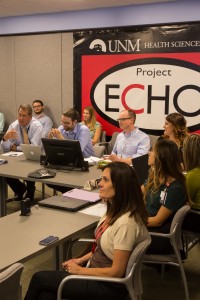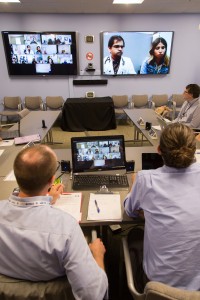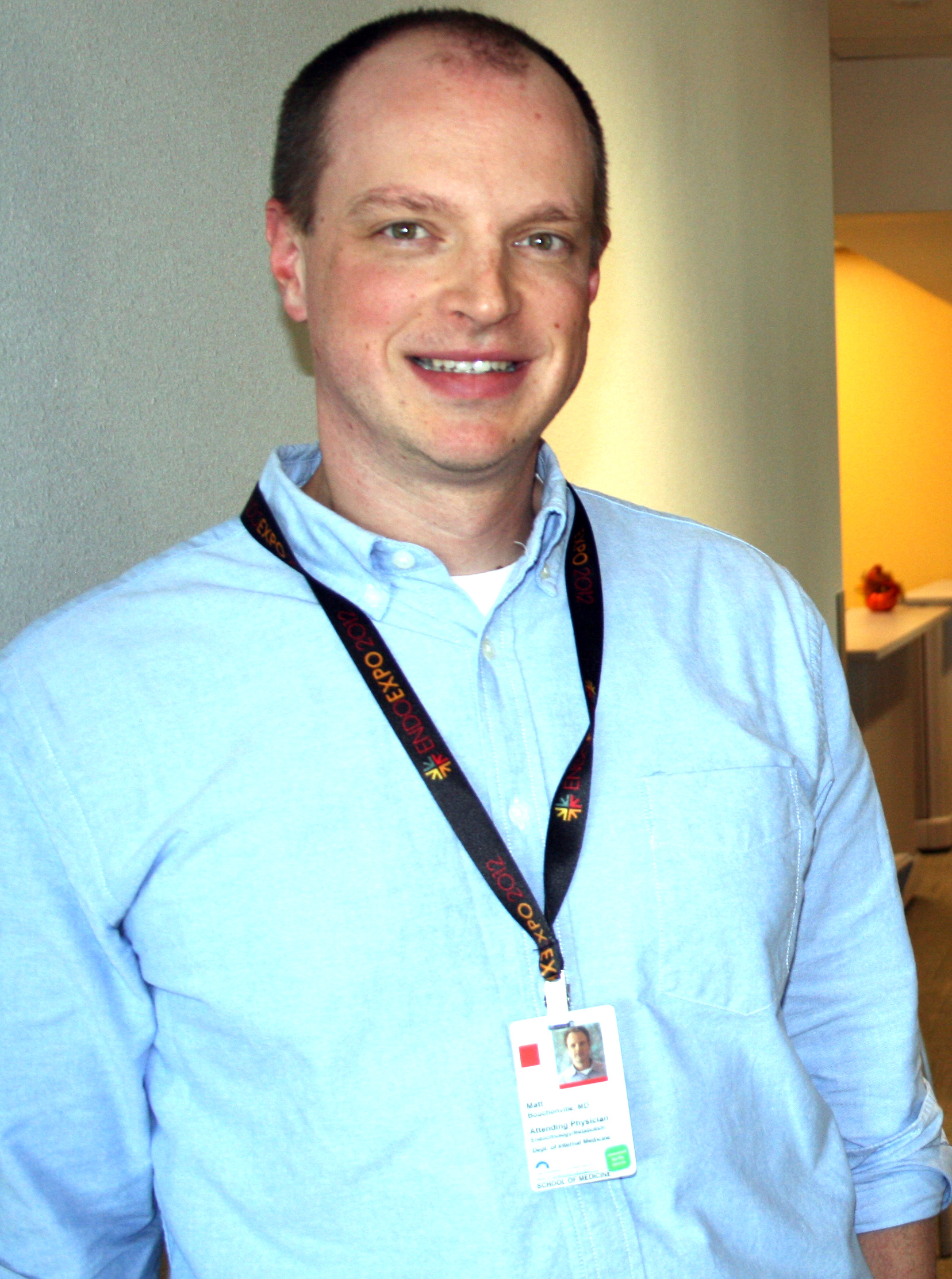A new way to deliver care via telemedicine has allowed one endocrinologist the ability to enhance his reach to patients he would otherwise never be able to treat…or even meet. Matthew Bouchonville, MD, an endocrinologist at the University of New Mexico, shares his experiences with Endo ECHO and its impact in rural New Mexico.
Every Wednesday at noon, my colleagues and I gather around a U-shaped conference table in front of a giant flat-screen TV. One by one, the faces of our community partners pop up: primary care doctors, nurses, physician assistants, and community health workers from nine federally qualified health centers (FQHCs) across New Mexico.
Here, at our “hub” in Albuquerque at the University of New Mexico, we have at the table an adult endocrinologist (me), a pediatric endocrinologist, a nephrologist, a pharmacist, a psychiatrist, a nurse manager, a community health worker, and a social worker. For the next two hours, we listen and ask questions as the primary care teams at the FQHCs present their cases of patients who have diabetes.
When patients have significant psycho-social barriers — as so many patients with diabetes do — it’s important for doctors to step back and consider their patients’ priorities so that they can guide them toward self-management in ways that fit their lives.
We don’t see these patients directly. Yet, by “telementoring” our FQHC colleagues, we are helping to ensure that they receive excellent, comprehensive care for their conditions from trained providers in their home communities, instead of having to wait for months and drive for hours to see us, the specialists.
A Meaningful Solution
Approximately 30 million people in the U.S. have diabetes, and 40% of those cases are uncontrolled. Although diabetes is a manageable disease, our healthcare system is struggling to meet the demand for care at a time when the number of endocrinologists is shrinking.

I’m now part of a meaningful solution to that problem. It’s an exciting new approach to care delivery that we’re calling “Endo ECHO,” and it has made me a better doctor. (ECHO stands for Extension for Community Healthcare Outcomes and is a collaborative model of medical education and care management that empowers clinicians to provide better care to more people, right where they live.)
By sharing my expertise as an endocrinologist and working as part of a multi-disciplinary team to mentor primary care providers in rural and underserved communities, I’m helping more patients with diabetes and other endocrine conditions get the care they need and live healthier lives. I’m actually reaching exponentially more patients than I do by seeing patients one on one.
And the care, I believe, is better, because it is informed by specialists across disciplines — in real time. During our Endo ECHO clinics, we discuss not only whether a patient’s blood glucose is under control, but also whether he has depression, taking prescription medications for co-morbid conditions, has adequate home support, and other aspects of his life.
Patient Goals
By bringing the perspectives of a range of professionals together all at once to bear on patient care recommendations, we not only expand access to specialty care but we also expedite the entire treatment process. For a patient to get referrals and appointments for each of these specialists separately would probably take months.
Most importantly, during the weekly teleclinics, we ask our community partners to tell us about their patients’ goals. What is most important to the patient?
This is a question that too often gets lost in the disease management process. Before I began participating in Endo ECHO, my treatment was oriented around my goals as a doctor. But when patients have significant psycho-social barriers — as so many patients with diabetes do — it’s important for doctors to step back and consider their patients’ priorities so that they can guide them toward self-management in ways that fit their lives.
Otherwise you might never achieve your goals as a doctor for your patient. And then the patient is labelled as non-compliant.
For example, in my own practice, I recently saw a patient with type 2 diabetes who wasn’t self-managing. Instead of counseling her about non-compliance, I asked her about her life. And I listened.
It turned out that she’s taking care of a father with Alzheimer’s, as well as a son who has depression. By the time we finished our conversation, she realized that, in order to take care of others, she needed to take better care of herself.
Before Endo ECHO, I would not have had that conversation.
Supporting Front-Line Providers
But the real power of Endo ECHO is at the community level, among front-line providers who previously struggled to keep up with new diabetes technologies, had difficulty accessing specialty expertise in a timely manner, and generally had little support.

Through Endo ECHO, these primary care providers are newly empowered: They belong to an ongoing learning network; they are constantly exposed to best practices; and they have mentoring relationships with a team of specialists who are also available to them outside the weekly teleclinics.
All this is particularly helpful in managing patients with Type 1 diabetes, where changing technology plays such an important role.
In addition, each FQHC in Endo ECHO is paired with a community health worker whose job is to help patients navigate their psycho-social issues and act as their advocate. The community health workers are essential members of the Endo ECHO team, because of their close relationships with their patients and insights into their patients’ everyday lives and challenges.
Like all doctors, I went into medicine to do good. Through Endo ECHO, I am part of a movement, practicing medicine in a way that I never dreamed of doing, collaboratively, in a community of free and ongoing knowledge-sharing, for the benefit of patients I will never know, or even see.
About Matthew Bouchonville
Matthew Bouchonville has been a faculty member of the University of New Mexico School of Medicine Division of Endocrinology, Diabetes, and Metabolism since 2011. As Medical Director of Endo ECHO, he mentors multiple clinicians in underserved communities around the state in collaboration with a multidisciplinary panel of experts to leverage scarce specialty resources to the front lines of community care. Bouchonville’s goal is to improve access to care for all patients with diabetes and other metabolic conditions by sharing the lessons learned from Endo ECHO with academic medical centers around the world. He is a 2006 graduate of the Eastern Virginia Medical School Medical College and is fluent in Spanish and Vietnamese (in addition to English).


